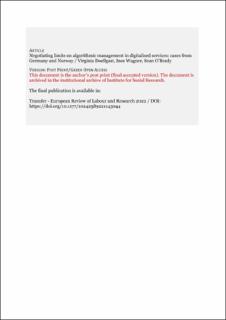Negotiating limits on algorithmic management in digitalised services: cases from Germany and Norway
Peer reviewed, Journal article
Accepted version
Date
2022Metadata
Show full item recordCollections
- Publikasjoner fra CRIStin [710]
- Tidsskriftpublikasjon [386]
Original version
Transfer - European Review of Labour and Research. 2022, . 10.1177/10242589221143044Abstract
Artificial intelligence (AI)-based algorithms are increasingly used to monitor employees and to automate management decisions. In this article, we ask how worker representatives adapt traditional collective voice institutions to regulate the adoption and use of these tools in the workplace. Our findings are based on a comparative study of union and works council responses to algorithmic management in contact centres from two similar telecommunications companies in Germany and Norway. In both case studies, worker representatives mobilised collective voice institutions to protect worker privacy and discretion associated with remote monitoring and workforce management technologies. However, they relied on different sources of institutional power, connected to co-determination rights, enforcement of data protection laws, and labour cooperation structures. Negotiating limits on algorithmic management in digitalised services: cases from Germany and Norway
